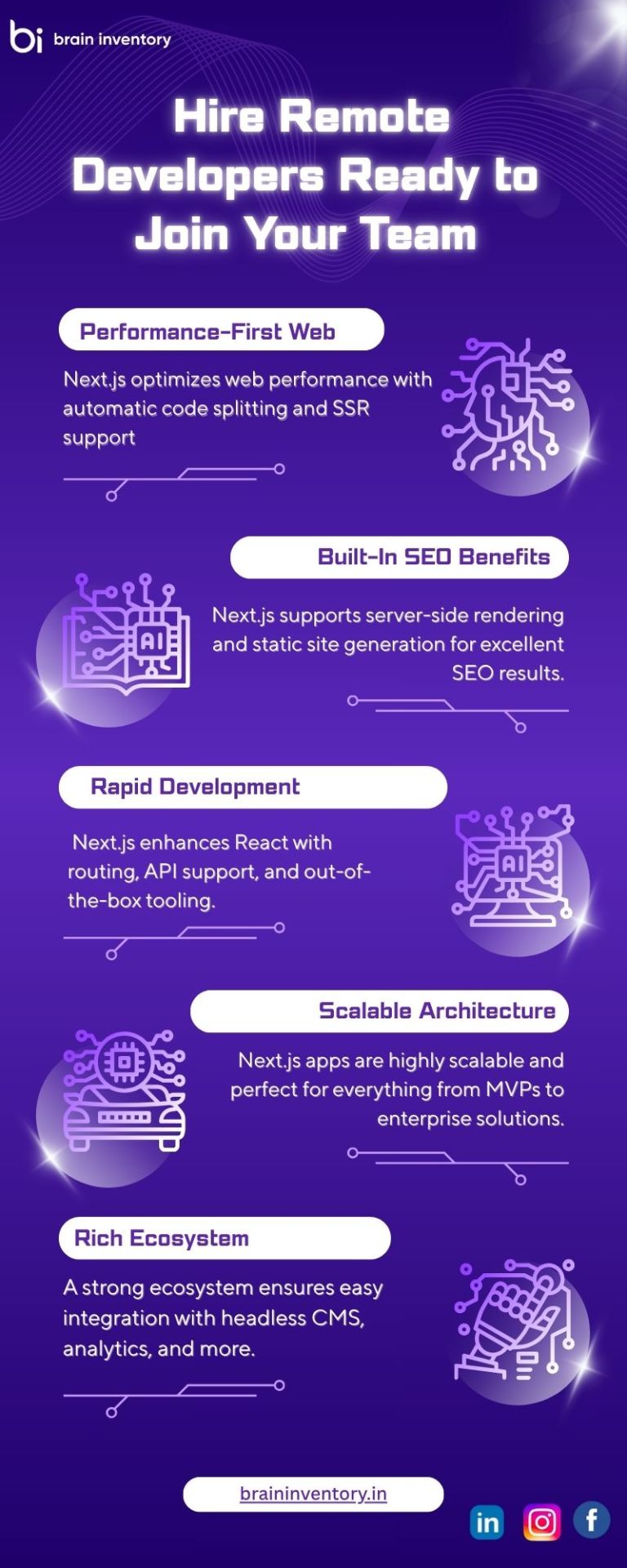#hire Next.js developers
Explore tagged Tumblr posts
Text
Why Next.js is Dominating Web Development
Let’s be real—speed, performance, and SEO aren’t optional anymore. That’s where we need to hire dedicated Next.js developers. Built on React, it brings server-side rendering, static site generation, and an intuitive dev experience under one roof. For companies looking to build scalable, fast, and search-optimized web apps, Next.js is a no-brainer.

The Rising Demand for Dedicated Next.js Developers in the USA
With digital transformation accelerating post-pandemic, U.S. businesses are scrambling to launch or revamp their web platforms. And guess what? They need specialists. Dedicated Next.js developers are now in high demand for startups, SMBs, and Fortune 500s alike.
What is Next.js?
Key Features and Benefits
Next.js is an open-source React framework that enables features like:
Server-Side Rendering (SSR)
Static Site Generation (SSG)
Built-in routing
Fast refresh1`
API routes
The result? A blazing-fast app that Google loves to rank.
Why Businesses are Choosing Next.js for Web Applications
It's not just a dev trend—Next.js is solving real problems. Better SEO, instant page loads, and a strong developer ecosystem mean companies can launch smarter, faster, and cheaper.
Who are Next.js Developers?
Core Skills and Responsibilities
A good Next.js dev should have:
Deep knowledge of JavaScript/TypeScript
Experience with React, Node.js
Understanding of SSR, SSG, and API Routes
Familiarity with CMSs, databases, and cloud hosting
They write clean code, optimize for speed, and know how to scale web applications.
Frontend vs Full-Stack Next.js Developers
Frontend Developers: Handle UI, animations, and layouts.
Full-Stack Developers: Manage both frontend and backend logic, often integrating databases and APIs.
Benefits of Hiring Dedicated Next.js Developers
Scalability & Performance Optimization
With a dedicated developer, your app is built with performance in mind from day one—no bloated code, no lag.
SEO-Ready Development
Next.js is designed for SEO, but it still takes skill to implement it correctly. A dedicated dev ensures your app ranks higher, loads faster, and converts better.
Fast Deployment and Iteration
Tight deadlines? No problem. Dedicated developers focus solely on your project, getting updates out in days, not weeks.
When Should You Hire a Custom Software Development Company?
Complex Project Requirements
If your project needs more than just a landing page—think dashboards, real-time features, or advanced integrations—you’ll need a full team.
Ongoing Maintenance and Support
Software isn’t “set it and forget it.” A Custom Software Development Company offers ongoing updates, bug fixes, and performance monitoring.
Access to a Full Development Stack
Agencies offer project managers, QA testers, UI/UX designers, and DevOps—all under one roof.
How to Choose the Right Custom Software Development Company in the USA
Experience with Next.js Projects
Make sure the company has live, working examples of Next.js applications they’ve built.
Industry-Specific Expertise
Healthcare, fintech, eCommerce—whatever your niche, choose a team that’s done similar work before.
Client Reviews and Portfolio
Check platforms like Clutch, GoodFirms, or even LinkedIn. Happy clients = trustworthy agency.
In-House vs Dedicated Next.js Developers
Cost Comparison
Hiring in-house means paying salaries, benefits, and overhead. Dedicated developers (especially remote) often come at a fraction of the cost.
Flexibility and Focus
Dedicated devs are laser-focused on your project—no multitasking with other teams.
Communication and Time-Zone Benefits
US-based dedicated developers are aligned with your working hours, making daily standups and real-time updates easy.
Where to Find Top Next.js Developers
Freelance Platforms
Check Upwork, Freelancer, and Toptal for vetted devs. Ideal for short-term projects.
Specialized Dev Agencies
Agencies like Vercel Partners or USA-based software houses provide pre-vetted Next.js experts with full-stack support.
US-Based Tech Hubs
Cities like San Francisco, Austin, New York, and Chicago are hotspots for top-tier Next.js talent.
Cost of Hiring Next.js Developers
Hourly, Monthly & Project-Based Rates
Hourly: $40–$150/hr
Monthly: $6,000–$15,000+
Project-Based: $10,000–$100,000+
Factors That Influence Pricing
Experience level
Project complexity
Agency vs Freelancer
US vs offshore
Budgeting Tips
Start with an MVP
Use agile methodology
Prioritize high-impact features
Interviewing and Vetting Next.js Developers
Must-Ask Technical Questions
How do you implement SSR in Next.js?
Can you explain the difference between getServerSideProps and getStaticProps?
What’s your approach to optimizing performance?
Soft Skills That Matter
Communication
Problem-solving
Accountability
Red Flags to Avoid
Vague answers
No GitHub or portfolio
Unrealistic timelines
Best Practices for Managing Remote Next.js Developers
Communication Tools
Use Slack, Zoom, and Notion for async and real-time updates.
Sprint Planning and Task Management
Stick to 1–2 week sprints using Jira or Trello. Always define clear deliverables.
Code Review and QA Workflow
Use GitHub/GitLab for pull requests
#hire nextjs development company#hire next#hire next.js developers#hire next.js developer#hire dedicated nextjs developer
0 notes
Text

Leveraging Next.js for Faster Web Development
Learn how Next.js simplifies web development with improved performance, SEO, and scalability, making it perfect for fast, high-performance applications.
#website development company in usa#custom web development company#freelance Next.js developers#hire dedicated next.js developers#hire next js developer#hire Next.js developers
0 notes
Text

Leveraging Next.js for Faster Web Development
Accelerate your development with Next.js — combining speed, SEO, and flexibility in one powerful framework.
#hire nextjs developers#hiring Next.js developers#Laravel and Next.js#Laravel development companies#web development company usa
0 notes
Text
Shaping the Future of Web Development with the Power of Next.js

In today’s rapidly evolving digital landscape, businesses need more than just a website - they need a fast, scalable, and user-centric web presence that delivers real results.��
Next.js is rapidly becoming the go-to framework for modern web development, offering developers a seamless blend of performance, scalability, and user experience. Here’s why it’s making waves in the industry - and why your business should consider it for your next web project.
Why Next.js is Transforming Modern Web Development
From startups to global enterprises, Next.js is changing how businesses build digital experiences. Its flexibility, speed, and developer-friendly features make it the perfect framework for future-ready web solutions.
1. Blazing Fast Performance
Speed is no longer optional — it’s expected. With Server-Side Rendering (SSR) and Static Site Generation (SSG), Next.js enables faster load times, improving user experience and boosting SEO rankings. Faster websites mean better engagement, reduced bounce rates, and higher conversions.
2. SEO-Friendly Architecture
Next.js is built with SEO in mind. Its server-rendered content ensures search engines can easily crawl and index your site, helping your business rank higher in search results while delivering a flawless experience to users. For any Next.js web development company, SEO-optimized web applications are a top priority — and Next.js development delivers that effortlessly.
3. Seamless Scalability
Whether you're building a simple landing page or a robust enterprise portal, Next.js scales effortlessly. Its hybrid rendering capabilities support both static and dynamic content — making it ideal for projects of all sizes.
4. Built on React Ecosystem
Built on React, one of the most widely adopted JavaScript libraries, Next.js lets development teams use familiar tools while unlocking powerful capabilities like routing, server-side rendering, and seamless API integration.
5. Developer-Friendly Out-of-the-Box Features
Next.js provides built-in tools and features that accelerate time-to-market:
File-based Routing
Automatic Code Splitting
Image Optimization
API Routes
TypeScript Support
Performance Analytics
All of these features allow Next.js developers in India and across the world to build scalable, performance-driven applications in record time.
🚀 Let’s Build Smarter, Faster, and Future-Ready Web Experiences
At VeravalOnline Private Limited, we bring together creativity, technology, and strategy to develop scalable, SEO-optimized, and high-performing web applications using the power of Next.js.
We’re not just developers — we’re your digital partners, offering:
🔹 Advanced Next.js Development — From SSR to SSG, we build blazing-fast apps with clean architecture 🔹 Tailored Web Solutions — Every project is custom-built to meet your business goals 🔹 UI/UX That Converts — Visually appealing, intuitive, and user-first design approaches 🔹 SEO-Optimized Frameworks — Built to perform and rank in the digital space 🔹 Robust Integration Capabilities — API-first and headless-ready for seamless experiences 🔹 Growth- at evolve with your business
From idea to execution, we help turn your vision into a powerful digital product.
💬 Have a project in mind? Let’s connect and build something truly game-changing — with the tech, talent, and tools to lead your digital future.
👉 VeravalOnline Private Limited — Powering Progress, One Line of Code at a Time.
Conclusion
Next.js is shaping the future of web development — empowering businesses to create lightning-fast, scalable, and SEO-friendly web solutions that deliver exceptional user experiences.
#Next.js Development Company#Next.js Web Development#Next.js Developers India#Best Next.js Web Development Services#Hire Next.js Developer#SEO Optimized Web Development
0 notes
Text
Hire Next.js Developers
Unlock the power of Next.js with our expert developers. Hire Next.js Developers from 7Span! which excels in delivering high-performance, SEO-optimized web applications tailored to your business needs. Leverage our custom Next.js web development services to build dynamic, user-centric websites that stand out. Our team specializes in creating scalable solutions tailored to your unique business requirements, ensuring a seamless user experience across all devices.
join us and experience the benefits and advantages of Next.js!
0 notes
Text

How to Use Laravel with React, Vue, or Next.js?
Learn how to build modern, interactive web applications by integrating Laravel with React, Vue, or Next.js
#How to Use Laravel with Vue#laravel next.js#laravel vs nextjs#laravel vs react#How to Use Laravel with Next.js#hire expert laravel developer#hire Laravel Developer
0 notes
Text
Next.js vs. Other Frameworks: A Comparative Analysis

Introduction:
In the realm of web development, choosing the right framework can significantly impact the success and efficiency of your projects. Next.js has gained traction as a popular framework, but how does it stack up against other contenders? In this article, we'll conduct a comparative analysis of Next.js with other leading frameworks to help you make informed decisions for your development endeavors.
Understanding Next.js:
Next.js has emerged as a versatile framework, renowned for its seamless integration with React and advanced features such as server-side rendering, automatic code splitting, and routing. Its flexibility and performance make it a favorite among developers for building dynamic and high-performance web applications.
Comparative Analysis:
1. Performance:
Next.js boasts excellent performance, thanks to features like server-side rendering, which enhances page loading speed and improves SEO. In comparison, some frameworks may require additional optimization to achieve similar performance levels.
2. Scalability:
Next.js offers scalability out of the box, allowing developers to effortlessly scale their applications as they grow. Other frameworks may require additional configuration or architectural changes to accommodate scalability needs.
3. Ease of Use:
One of Next.js's strengths is its simplicity and ease of use, with a minimalistic setup and intuitive API. While other frameworks may offer more customization options, they may also come with a steeper learning curve and require more boilerplate code.
4. Developer Expertise:
Next.js is relatively easy for developers familiar with React to pick up, making it an attractive choice for teams already invested in the React ecosystem. However, developers with expertise in other frameworks may require additional time to adapt to Next.js's conventions and best practices.
Conclusion:
In conclusion, Next.js shines as a powerful framework for building modern web applications, offering a balance of performance, scalability, ease of use, and developer productivity. While other frameworks may excel in certain areas, Next.js's comprehensive feature set and seamless integration with React make it a compelling choice for many development projects.
Final Thoughts:
Ultimately, the choice between Next.js and other frameworks depends on your project requirements, team expertise, and long-term goals. By carefully considering the factors discussed in this comparative analysis, you can make an informed decision that aligns with your development needs and objectives. Whether you are seeking Next.js development services in India, USA, Ahex Technologies stands as the premier choice for outsourcing expert Next.js development.
#Next.JS framework#Next.JS web app development#Next JS development#Next JS developer#Next JS web app#Next JS-based applications#Next JS-based framework apps#Next JS experts#Next.js development company#Customize Next JS web apps#Next JS web app development solutions#hire Next JS developers#expert Next.js developers
0 notes
Text
Hiring Top Next.js Developers: A Comprehensive Guide
Discover the best practices for hiring Next.js developers. In this guide from AskGalore, we cover the importance of Next js and roles, skills and assessment of Next.js developers.
0 notes
Text
Hire Next.js Developers for Speed & Performance
Hire skilled Next.js developers to create fast, SEO-friendly web applications that elevate your digital presence.
for more information visit :-

0 notes
Text
0 notes
Text
How to Choose the Right Tech Stack for Your Web App in 2025

In this article, you’ll learn how to confidently choose the right tech stack for your web app, avoid common mistakes, and stay future-proof. Whether you're building an MVP or scaling a SaaS platform, we’ll walk through every critical decision.
What Is a Tech Stack? (And Why It Matters More Than Ever)
Let’s not overcomplicate it. A tech stack is the combination of technologies you use to build and run a web app. It includes:
Front-end: What users see (e.g., React, Vue, Angular)
Back-end: What makes things work behind the scenes (e.g., Node.js, Django, Laravel)
Databases: Where your data lives (e.g., PostgreSQL, MongoDB, MySQL)
DevOps & Hosting: How your app is deployed and scaled (e.g., Docker, AWS, Vercel)
Why it matters: The wrong stack leads to poor performance, higher development costs, and scaling issues. The right stack supports speed, security, scalability, and a better developer experience.
Step 1: Define Your Web App’s Core Purpose
Before choosing tools, define the problem your app solves.
Is it data-heavy like an analytics dashboard?
Real-time focused, like a messaging or collaboration app?
Mobile-first, for customers on the go?
AI-driven, using machine learning in workflows?
Example: If you're building a streaming app, you need a tech stack optimized for media delivery, latency, and concurrent user handling.
Need help defining your app’s vision? Bluell AB’s Web Development service can guide you from idea to architecture.
Step 2: Consider Scalability from Day One
Most startups make the mistake of only thinking about MVP speed. But scaling problems can cost you down the line.
Here’s what to keep in mind:
Stateless architecture supports horizontal scaling
Choose microservices or modular monoliths based on team size and scope
Go for asynchronous processing (e.g., Node.js, Python Celery)
Use CDNs and caching for frontend optimization
A poorly optimized stack can increase infrastructure costs by 30–50% during scale. So, choose a stack that lets you scale without rewriting everything.
Step 3: Think Developer Availability & Community
Great tech means nothing if you can’t find people who can use it well.
Ask yourself:
Are there enough developers skilled in this tech?
Is the community strong and active?
Are there plenty of open-source tools and integrations?
Example: Choosing Go or Elixir might give you performance gains, but hiring developers can be tough compared to React or Node.js ecosystems.
Step 4: Match the Stack with the Right Architecture Pattern
Do you need:
A Monolithic app? Best for MVPs and small teams.
A Microservices architecture? Ideal for large-scale SaaS platforms.
A Serverless model? Great for event-driven apps or unpredictable traffic.
Pro Tip: Don’t over-engineer. Start with a modular monolith, then migrate as you grow.
Step 5: Prioritize Speed and Performance
In 2025, user patience is non-existent. Google says 53% of mobile users leave a page that takes more than 3 seconds to load.
To ensure speed:
Use Next.js or Nuxt.js for server-side rendering
Optimize images and use lazy loading
Use Redis or Memcached for caching
Integrate CDNs like Cloudflare
Benchmark early and often. Use tools like Lighthouse, WebPageTest, and New Relic to monitor.
Step 6: Plan for Integration and APIs
Your app doesn’t live in a vacuum. Think about:
Payment gateways (Stripe, PayPal)
CRM/ERP tools (Salesforce, HubSpot)
3rd-party APIs (OpenAI, Google Maps)
Make sure your stack supports REST or GraphQL seamlessly and has robust middleware for secure integration.

Step 7: Security and Compliance First
Security can’t be an afterthought.
Use stacks that support JWT, OAuth2, and secure sessions
Make sure your database handles encryption-at-rest
Use HTTPS, rate limiting, and sanitize inputs
Data breaches cost startups an average of $3.86 million. Prevention is cheaper than reaction.
Step 8: Don’t Ignore Cost and Licensing
Open source doesn’t always mean free. Some tools have enterprise licenses, usage limits, or require premium add-ons.
Cost checklist:
Licensing (e.g., Firebase becomes costly at scale)
DevOps costs (e.g., AWS vs. DigitalOcean)
Developer productivity (fewer bugs = lower costs)
Budgeting for technology should include time to hire, cost to scale, and infrastructure support.
Step 9: Understand the Role of DevOps and CI/CD
Continuous integration and continuous deployment (CI/CD) aren’t optional anymore.
Choose a tech stack that:
Works well with GitHub Actions, GitLab CI, or Jenkins
Supports containerization with Docker and Kubernetes
Enables fast rollback and testing
This reduces downtime and lets your team iterate faster.
Step 10: Evaluate Real-World Use Cases
Here’s how popular stacks perform:

Look at what companies are using, then adapt, don’t copy blindly.
How Bluell Can Help You Make the Right Tech Choice
Choosing a tech stack isn’t just technical, it’s strategic. Bluell specializes in full-stack development and helps startups and growing companies build modern, scalable web apps. Whether you’re validating an MVP or building a SaaS product from scratch, we can help you pick the right tools from day one.
Conclusion
Think of your tech stack like choosing a foundation for a building. You don’t want to rebuild it when you’re five stories up.
Here’s a quick recap to guide your decision:
Know your app’s purpose
Plan for future growth
Prioritize developer availability and ecosystem
Don’t ignore performance, security, or cost
Lean into CI/CD and DevOps early
Make data-backed decisions, not just trendy ones
Make your tech stack work for your users, your team, and your business, not the other way around.
1 note
·
View note
Text
Next JS vs React: Which Framework to Choose for Optimal Frontend in 2024.

Read more Blogs,
Visit Website, Glasier Inc.
ReactJS development company
Hire Reactjs developers
Hire SaaS developers
Hire Android app developers
Hire IOS developers
#react js vs next js#next vs react#hire react js developers#hire dedicated developers#hire android developers#hire ios developers#react js development company#mobile app development company#ios app development services#custom software development company#custom software development
2 notes
·
View notes
Text
Benefits of Hiring Dedicated Next.js Developers for Your Project

Tech organizations are searching for strong, scalable frameworks for their projects as more and more enterprises adopt contemporary online technology. One of the most widely used frameworks for creating quick, scalable, and SEO-friendly applications is Next.js.
Employing Next.js engineers allows companies to take advantage of the full potential of this React-based framework, which leads to improved user experiences, quicker development cycles, and improved performance. This article will discuss the main advantages of working with specialized Next.js developers and why they would be a good fit for your upcoming project.
Unlock the Power of Next.js for Your Business Needs
Improved Performance and Faster Development
Server-side rendering (SSR) and static site generation (SSG) are two of the many performance enhancements that Next.js provides by default. Better SEO performance and quicker load times are ensured by these improvements. Hiring Next.js engineers guarantees that your application or website takes advantage of these pre-built capabilities, cutting down on development time and improving customer satisfaction.
Developers can create intricate applications with little effort thanks to these optimizations and the React ecosystem. The efficient use of these technologies by committed Next.js developers results in faster delivery times and less money spent on performance optimization.
Seamless Integration with React
Since Next.js is based on React, it is an obvious choice for applications that use React. Hiring Next js developers for a React project guarantees seamless integration with your current codebase, freeing up your developers to concentrate on developing new features rather than navigating intricate integration problems.
Your team can create apps that fully utilize React's component-based architecture while utilizing Next.js's sophisticated features, such as code splitting and optimized static content generation, by collaborating with Next.js developers.
SEO-Friendly Applications
The ability of Next.js to produce SEO-friendly applications is among its most prominent advantages. Search engines can readily crawl and index your material because Next.js supports server-side rendering and the creation of static websites. For tech companies trying to raise their online presence and search engine rankings, this is extremely beneficial.
Hiring specialized Next.js developers guarantees that your application or website is SEO-optimized from the beginning, increasing traffic and lead generation for your company.
Scalability and Flexibility
Because of its great scalability, Next.js is a great framework for companies who want to create apps that can expand over time. Developers using Next.js can adapt the framework to your unique requirements, whether you are creating a big business application or a tiny landing page.
Next.js enables a smooth link between front-end React components and back-end APIs, which is useful if you need to hire full-stack developers to manage both the front-end and back-end. This guarantees that your application will be scalable as your company expands.
Expertise in the Latest Tools and Technologies
You are bringing in experts that are knowledgeable about the newest web development tools and trends when you hire Next js developers. Their expertise in JavaScript, React, and Next.js guarantees that your project is created using the most recent tools and best practices. A committed team working on your project gives you access to state-of-the-art knowledge that can improve the overall calibre of your application.
Conclusion: Accelerate Your Project’s Success
In conclusion, companies wishing to develop quick, scalable, and SEO-friendly apps would be well advised to hire Next js developers. Their knowledge enables you to take advantage of Next.js's capabilities to enhance the functionality, user experience, and search engine rankings of your website.
A committed Next.js developer guarantees the timely and excellent completion of your project. Hiring backend developers with expertise in creating scalable server-side solutions will enhance your front-end team and guarantee that your application is well-rounded and ready for expansion if your project also calls for strong backend capabilities. Tech organizations can attain long-term success and advance their initiatives by collaborating with the right experts.
0 notes
Text

React JS App Development Company Delhi | Scalable Frontend Solutions Oprezo
React JS Development Company in India Oprezo India
1. Introductiona
Oprezo India is a trusted name in React JS development, offering high-performance, dynamic, and scalable frontend solutions across Delhi, Noida, Ghaziabad, Meerut, Sonipat, and Gurugram. As a top React JS development company in India, we specialize in building interactive UIs, SPA (Single Page Applications), and full-stack React-based web apps that cater to startups, SMEs, and enterprises. Our team of React experts transforms business goals into high-performing digital experiences with speed and precision.
2. React JS Development Services
At Oprezo India, we provide a wide array of React JS services tailored to help your business scale rapidly:
Custom React JS Web Development
React JS UI/UX Component Development
Enterprise React Solutions
React Native Mobile App Development
Migration to React from Legacy Frameworks
React JS Frontend for MERN Stack Apps
React Performance Optimization
React JS Consulting and Code Audits
React Maintenance & Support Services
Whether you need a pixel-perfect frontend or a responsive web app, we deliver robust, reusable code architecture backed by scalable technologies.
3. Why Choose Oprezo India for React Development?
Expert React JS Developers with years of experience
Fast, SEO-optimized apps for improved performance and ranking
Mobile-first and responsive designs
Smooth API and backend integrations
Secure codebase with version control
Agile methodology with transparent sprints
4. React JS Development Process
Our streamlined process ensures quality and efficiency:
Requirement Gathering – Deep dive into your vision and app needs
Wireframing & UI Design – Tailored, modern interfaces
React Development – Component-based architecture using best practices
Testing & QA – Manual + automated testing for speed & security
Deployment & Launch – CI/CD pipeline for seamless rollouts
Support & Scaling – Ongoing optimization and feature upgrades
5. Technologies We Use
Frontend: React.js, Next.js, Redux, TailwindCSS, Material UI
Backend: Node.js, Express.js, Laravel, Django, Firebase
Mobile: React Native
Database: MongoDB, PostgreSQL, MySQL
DevOps: Docker, GitHub Actions, Jenkins
APIs: RESTful, GraphQL
People Also Search For oprezo india
Q1: Who are the best React JS developers in Delhi NCR? Oprezo India ranks among the top React JS development companies in Delhi NCR with expertise in building modern, scalable React applications.
Q2: What services do React JS companies in India offer? They offer web development, UI design, app development, React Native mobile solutions, and frontend integration.
Q3: Why hire React JS developers from Oprezo India? You get experienced developers, custom solutions, agile delivery, and complete post-launch support.
Q4: Do React developers at Oprezo build mobile apps? Yes, we build high-performance cross-platform apps using React Native.
Q5: Can I outsource React JS development to India? Absolutely. Oprezo India offers affordable, offshore React JS development with quality assurance and confidentiality.
FAQ – React JS Services
Q1: What is React JS used for? React JS is a JavaScript library for building user interfaces, especially single-page apps with dynamic content.
Q2: How much does it cost to develop a React app in India? Costs vary based on features, but basic React apps start from $3,000 and can go up to $50,000+ for enterprise-grade solutions.
Q3: Is React better than Angular or Vue? React is highly popular due to its flexibility, performance, and vast ecosystem, making it ideal for modern web and mobile apps.
Q4: Do you offer React training in Delhi? Yes, Oprezo India also runs a React JS Training Institute in Delhi for developers and corporates.
Q5: Can you upgrade my existing site to React? Yes, we offer complete migration services from legacy systems like jQuery, PHP, or Angular to React. Visit to Website links: www.oprezoindia.com Mail Id: [email protected] Contract Us: +91-7599677307
Conclusion
If you're looking to build modern, responsive, and scalable web applications, React JS is the future—and Oprezo India is your trusted partner in that journey. With presence across Delhi, Noida, Ghaziabad, Meerut, Sonipat, and Gurugram, we provide cutting-edge solutions backed by top-tier React developers. Let’s build something brilliant together
1 note
·
View note
Text
Sitecore CMS Headless is a way of developing applications using Sitecore’s content management system (CMS) where the front-end (the “head”) is decoupled from the back-end (the Sitecore instance), allowing for greater flexibility and scalability.
Sitecore headless important points:
1. Decoupling the Front-end and Back-end:
In a traditional CMS, the front-end and back-end are tightly coupled, meaning the presentation layer is directly tied to the content management system.
With Sitecore Headless, the front-end is separated, allowing developers to use any technology they want to build the user interface, while the Sitecore instance manages the content and provides it via APIs.
2. Sitecore Headless Services:
Sitecore provides a suite of services and APIs, formerly known as JSS Server Components, that enable this decoupling, allowing developers to build applications that consume Sitecore data and layout.
3. Rendering Hosts:
The front-end application, often referred to as a rendering host, consumes content and layout data from the Sitecore instance via APIs.
Sitecore jss with next.js project creation in disconnected development workflow, session-1
4. Benefits of Sitecore Headless CMS:
Flexibility: Developers can use any front-end technology or framework, including React, Angular, Vue.js, or Next.js.
Scalability: The decoupled architecture allows for easier scaling of both the front-end and back-end independently.
Faster Development: Developers can work on the front-end and back-end in parallel, without waiting for changes to the other side.
Modern Development Workflows: Sitecore Headless supports modern development workflows and application architectures.
5. Sitecore JavaScript Rendering SDKs (JSS):
JSS is a framework for developing JavaScript applications that can be used to build custom web-based UI components and plugins, and it helps developers create reusable modules in Sitecore.
6. Sitecore Headless Development Suite:
Sitecore provides a suite of services, APIs, and software development kits (SDKs) that allow you to develop decoupled applications using Sitecore data, transforming Sitecore into a headless content management system (CMS).
7. Examples of Sitecore Headless Solutions:
Sitecore XP/XM: Sitecore Headless Services a for Sitecore XP/XM.
Sitecore XM Cloud: Sitecore XM Cloud is a cloud-native, SaaS-powered content management system.
Hire Sitecore Developer & Expert, $15/hour
Sitecore CMS Solution Development Pricing
0 notes